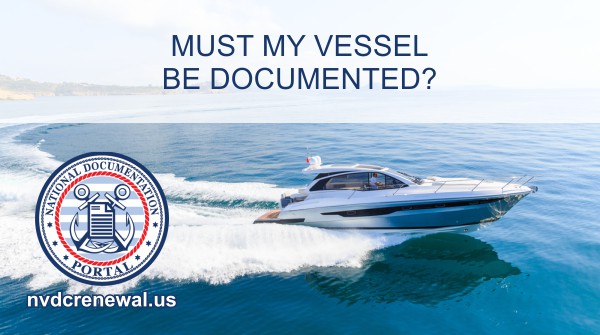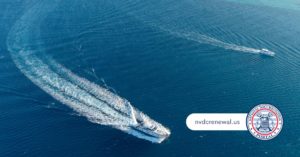Boat documentation is a legal requirement for certain vessels operating in the United States. Specifically, vessels that are at least five net tons and used for commercial fishing, coastwise trade, or transporting goods or passengers in U.S. navigable waters or within the Exclusive Economic Zone (EEZ) must be federally registered.
Owners of vessels that meet these criteria must obtain a Certificate of Documentation (COD) from the U.S. Coast Guard to ensure compliance with federal laws. Whether documentation is mandatory in your situation depends on the size, usage, and ownership of your boat.
When Boat Documentation is Required
Understanding whether boat documentation is required for your vessel is crucial for avoiding penalties and ensuring legal compliance. Documentation is mandatory for vessels that fit the following conditions:
- The vessel measures at least five net tons. This requirement typically applies to vessels around 25 feet in length or greater, depending on their design and tonnage capacity.
- The vessel is used commercially. This includes activities like fishing, transportation of goods, passenger services, and towing operations within U.S. waters or between U.S. ports and the EEZ.
For those whose vessels qualify under these categories, swift compliance with federal documentation regulations is necessary. Our services can assist with every step of this process, ensuring you meet the standards required for federal registration.
What is Considered a Commercial Vessel?
Commercial vessels are those engaged in activities that generate revenue or involve the operation of a business. Documentation for these vessels is often a requirement to participate in U.S. waters legally. Examples of commercial applications include:
Fishing Operations
Fishing vessels used for harvesting or processing fish within U.S. jurisdiction need boat documentation. This includes vessels operating in both inland and ocean waters, especially when the fisheries operate beyond state boundaries.
Transportation of Goods
Vessels carrying cargo between U.S. ports are also required to be documented, as this falls under coastwise trade. Documentation rules ensure that these vessels comply with safety and labor regulations applicable to federal and international trade routes.
Passenger Services
Passenger vessels used in coastwise trade—transporting people between points in the United States or in the EEZ—must also be federally documented. This includes ferries, charter boats, and other passenger-based services.
If your vessel operates commercially, our team can expedite your application for documentation, ensuring you have the right endorsements for your operations.
Voluntary Boat Documentation for Recreational Vessels
While mandatory documentation applies to certain commercial vessels, recreational boat owners may also choose to federally document their vessels, even when not required. Many recreational boat owners opt for voluntary documentation for the additional benefits it provides.
Benefits for Recreational Boat Owners
- National and International Recognition
A Certificate of Documentation is recognized globally as proof of ownership and nationality. If you enjoy boating across borders, documentation can simplify customs clearance and ensure smooth sailing in foreign waters.
- Ease of Financing
Many lenders require federal documentation for larger vessels before approving loans. A COD assures lenders of the vessel’s official status and registered ownership.
- Prestige and Security
For some owners, federal documentation adds credibility to their vessel, signaling that they’ve met rigorous registration standards. It also ensures that the vessel’s name and ownership details are securely recorded with the Coast Guard.
We can also help you to change your endorsement, too. We can assist with completing the paperwork, so you don’t miss any crucial steps.
Annual Renewal of Boat Documentation
Another requirement for maintaining compliance is the annual renewal of all boat documentation. A Certificate of Documentation is valid for one year from the date of issuance and must be renewed promptly to remain in effect. Allowing the certificate to lapse could result in penalties or potential operational disruption.
We make renewals simple by offering an efficient online system, so you can keep your boat documentation current without the stress of handling paperwork. When using our renewal services, you gain the peace of mind that your vessel remains compliant at all times.
How to Document Your Vessel
The process of obtaining boat documentation can be simplified by following a structured approach. Documentation involves providing proof of ownership, confirming the vessel’s eligibility, and selecting the appropriate endorsements for its intended use.
Steps in the Documentation Process
- Application Submission
It all begins with submitting Form CG-1258, the application for a Certificate of Documentation. This form captures essential details about your vessel, including its dimensions, net tonnage, and intended operational use. You’ll also need to provide supporting documents, such as a bill of sale, showing proof of ownership.
- Tonnage Assessment
Vessels are required to meet the minimum size of five net tons to qualify for documentation. For most boats, this equates to an average length of 25 feet or more, provided the design supports the necessary cargo or weight capacity. If you’re unsure about your boat’s tonnage, consult with a marine surveyor or allow us to guide you through proper tonnage calculations.
- Ownership and Citizenship Verification
Only U.S. citizens are eligible to document vessels under federal regulations. For corporations or multi-owner entities, ownership documentation must demonstrate compliance with these citizenship requirements.
- Endorsement Selection
Each application must specify an endorsement based on the vessel’s purpose. Common endorsements include coastwise trade, fishery operations, or recreational use. Consulting an expert can ensure you choose the endorsement that aligns with your vessel’s activities.
Our specialists streamline every step of this process, helping vessel owners avoid delays or errors in their applications.
What Happens if Boat Documentation is Not Maintained?
Operating a vessel without proper documentation where it is mandated can lead to serious consequences. The Coast Guard actively enforces these requirements, and non-compliance can result in fines, vessel seizure, or restrictions on your ability to operate within U.S. jurisdiction.
Even if documentation isn’t mandatory for your recreational vessel, failure to maintain proper records can complicate ownership transfers, financing, and border crossings. Protecting your investment starts with ensuring your vessel meets all federal requirements.
For those exploring the legal framework governing boat documentation in the U.S., we recommend visiting the Electronic Code of Federal Regulations. This resource offers in-depth details about documentation rules and processes.
Start the Boat Documentation Process Today
Whether boat documentation is mandatory for your vessel or you’re considering it for the added benefits, our team is here to help. From initial applications to renewals, we provide comprehensive tools and guidance to make the process seamless.
To get started, access our Initial Vessel Documentation form today. We ensure your documentation is handled properly and promptly, so you’re free to enjoy the benefits of owning a federally documented vessel without the added hassle.



